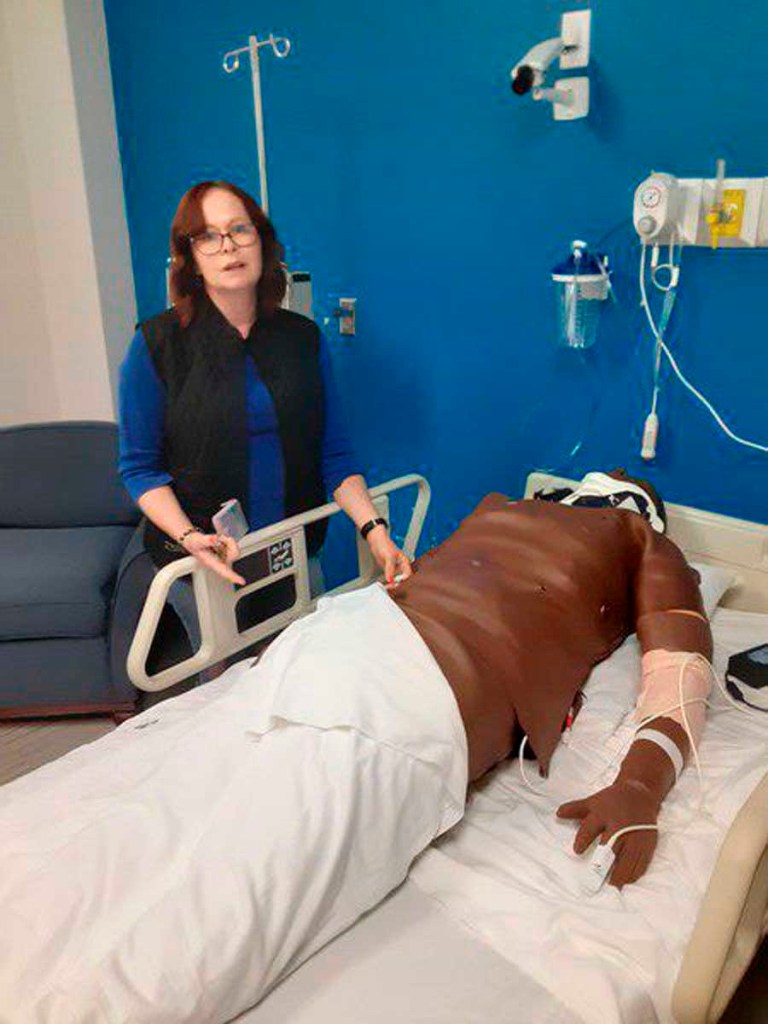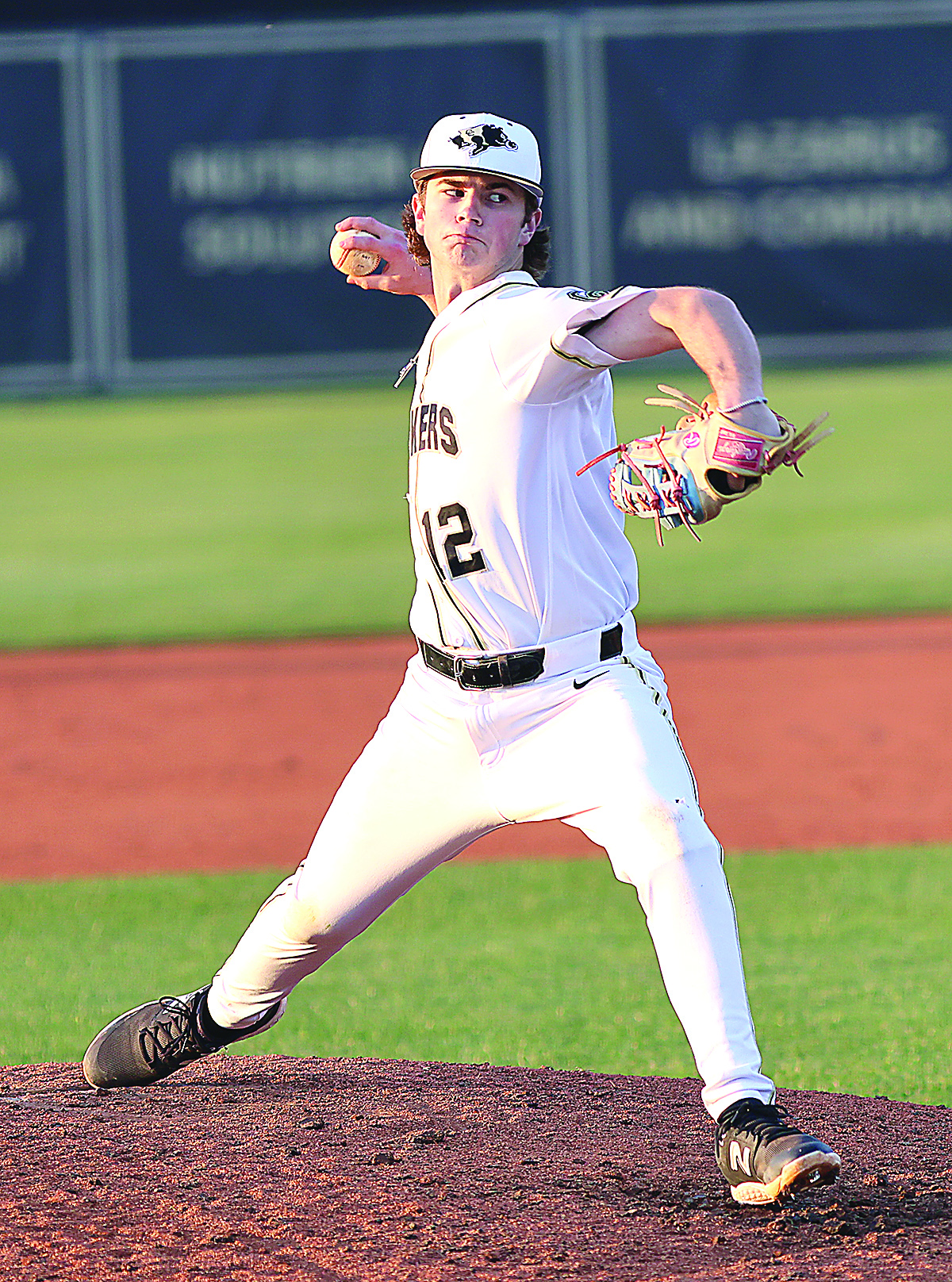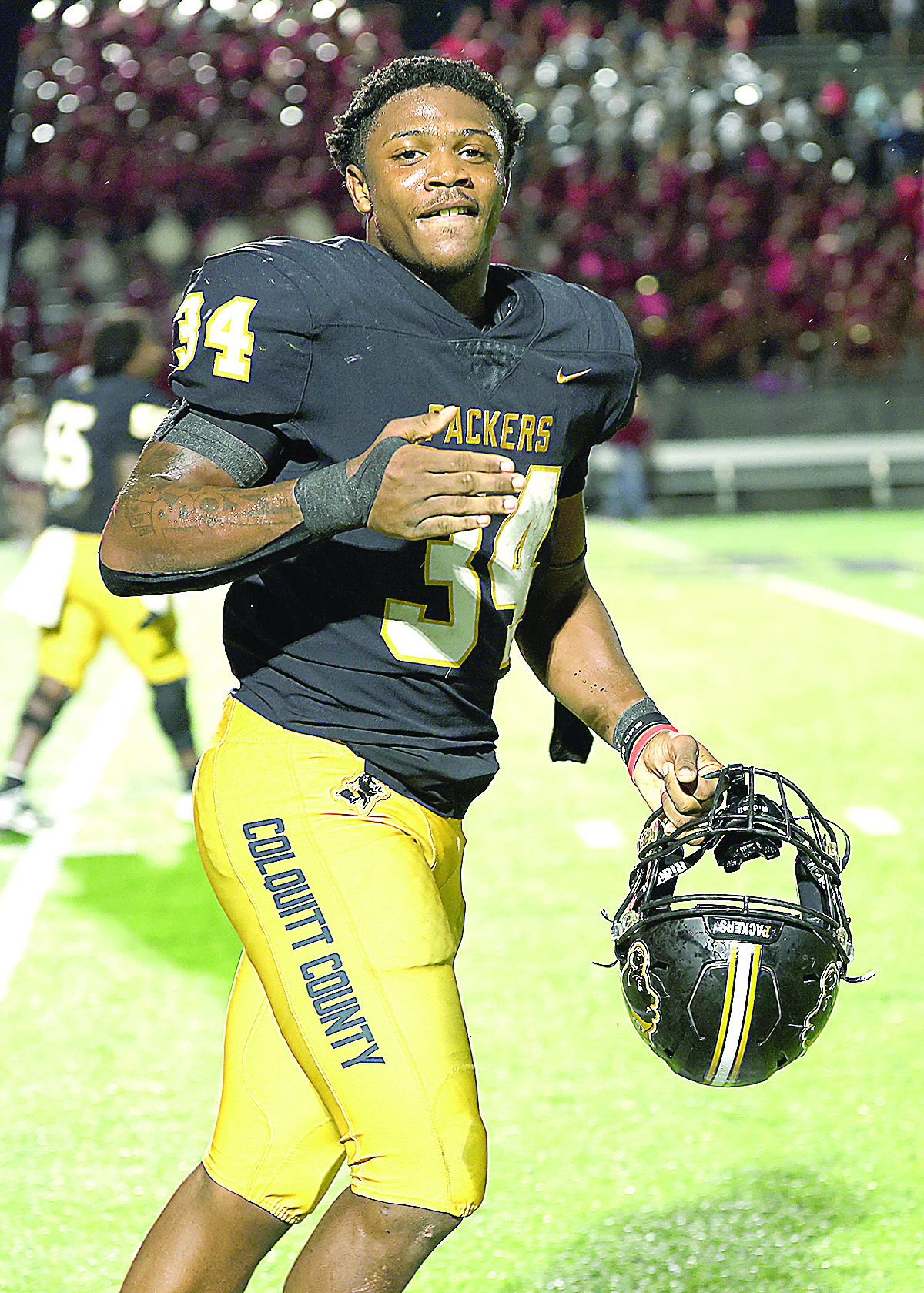‘A lot of imagination’: Dalton State transforms for distance learning
Published 11:38 am Monday, April 20, 2020

- Ryan Anderson/Daily Citizen-NewsShanon Windom, simulation lab coordinator in Dalton State College's School of Health Professions, discusses the use of one of the school's mannequins for instruction.
DALTON, Ga. — Like so many other schools, Dalton State College had to alter instruction considerably when the new coronavirus (COVID-19) pandemic prevented students and staff from gathering on campus — and do so quickly.
Because “we had our spring break before all this happened, we only had a week to figure out how to run a college and educate students without people on campus,” said Margaret Venable, president of Dalton State. Though the college for years had plans in place to continue learning in case of a disruptive event like a natural disaster, those assumed only a week or two absence from the campus, as well as the possibility of using other locations.
However, during this protracted shutdown, no one is allowed to gather in groups anywhere, Venable said. “We had some things in place, but we had to ramp up on very short notice, and (while) it hasn’t been easy, I’m impressed by how our faculty and staff has converted to (the virtual) format.”
While some students have “spotty” or limited internet access, “we have really compassionate faculty who have been responsive to their individual needs,” and though some professors “had never given a moment’s thought” to online education, they’ve been willing to take advice from technologically-adroit students, Venable said. “The teachers can become the (students), and students become the mentors, but I think that’s a good thing.”
Students who had been meeting regularly with counselors have been able to continue doing so virtually, and “we’re still processing applications and financial aid, just virtually,” she said. “Colleges offer so many services people don’t always think about right away.”
Dalton State College’s tuition and fees will remain the same for the 2020-21 school year after the Board of Regents approved no increase in tuition at any of the 26 University System of Georgia institutions, according to Dalton State. The college already ranks among the top 10% for the lowest net price (cost of attendance minus grant/scholarship aid) in the nation, according to the College Affordability and Transparency List compiled by the U.S. Department of Education.
Venable’s concerns focus primarily on “hands-on, practical courses,” because those experiences can’t be replaced, but simulations do help, she said. Furthermore, “so many (student) internships have been interrupted, and we’ve handled those on an individual basis.”
Capstone projects and similar assignments are likewise being handled on a case-by-case basis, she said, noting, “We’ve had to be creative.”
“We’re not going to let this interfere with the ability of anyone to graduate,” she said. “The solutions are all different, but we’re addressing those issues with students.”
Additionally, “we don’t want to keep students from coming to college any more than we want to keep them from graduating,” so Dalton State has waived standardized test score requirements for incoming freshmen, she said. Other criteria, such as high school grade point average, are being taken into account.
There have been “pleasant surprises,” too, she said. For example, the college had a career week planned, including a career fair, interview workshops and social media symposiums, but instead of meeting in person, those enrichment opportunities were all moved online, and “I was really impressed.”
Dalton State has yet to make a “firm” decision on commencement, mostly because it remains unclear when individuals will again be permitted to gather in large groups, she said. Students are being surveyed regarding their preferences, however, and “most say they want some in-person experience,” so “we will definitely do something.”
Unfortunately, so many of the spring’s touchstones, from sports to plays to awards ceremonies, “we won’t get back,” she said. “Usually, this time of year, there are so many activities in the evenings, and I’m missing those.”
Dalton State does have roughly 16 students still living on campus who were unable to return to their homes for various reasons, she said. “We are still feeding them, we’re asking them to maintain social distance, and we’re addressing their needs.”
Department of Communication
Dalton State has given faculty members “freedom to try out something, to not always be perfect,” so Jerry Drye, an associate professor of communication, has likewise given his students room to experiment, he said. “We aim for perfect and hope to hit excellence.”
Drye understands so many of his students are experiencing challenges outside of the academic realm, he said. Many of them work, they’ve either lost jobs, or they’re “on the front lines” in spots like grocery stores and hospitals, so “I don’t want to overload them and give them more stress.”
“It’s not ideal, but I tell them we’ll get through this together,” he said. “The biggest challenge is just the uncertainty.”
He’s also emphasizing the value of levity with his students, because “one of the most important things we can do is maintain a sense of humor,” he said. “In times like this, laughter is not a luxury, but a necessity.”
His upper level courses have been easier to convert to digital learning, he said. His humor communication class, for example, “was the easiest one for me to transfer.”
On the other hand, speech courses have presented a different obstacle.
“You have them video speeches and submit them, which they’ve been doing, and it’s workable, but it’s not ideal,” he said. “They’re learning how to communicate with the camera, and they still have to research, write and present, but there’s no substitute for doing speeches in front of an audience.”
While “I miss the interaction with students — the classroom is where I feel at home, and it’s my home away from home — the decision to go online was the right one to make, (because) there was no real choice,” he said. “It’s always a challenge to change midstream, but it offers interesting opportunities, (and) one of the good things that may come out of this is how important that personal touch is — we’ve become so addicted to technological aspects of communication that we have lost some of the personal touch.”
He does believe he may do better as an instructor with digital learning this summer since he’s now had practice, but he hopes students can return to campus for the start of the 2020-21 school year, he said. “I’m teaching a team/small group communication class, and it won’t be the full (impact) if they can’t work together in person.”
Department of Nursing
For the Department of Nursing, the “theory” part of classes wasn’t onerous to move online, in part because “our nursing program has been a hybrid for several years,” where numerous elements of instruction already were online, said Sylvia Driver, chair, professor and program director for the Department of Nursing. “That was to our benefit at this moment.”
“Lectures are all online for the theory component,” and every course has a designated day and time to meet via Zoom, typically on the day and time when the course met before campus shut down, said Driver. Additionally, “we’re keeping in touch with our students as much as we can, but that is our standard anyway; we are pretty close to our students.”
Simulations and clinical hours have required more ingenuity to make up, however, she said. “You can never reproduce hands-on.”
Videos are one answer, and recordings were already crucial to the school of nursing even before this pandemic, she said. In the simulation lab, students do pre-assignments that relate to the simulation they’ll work on that day, then they practice on mannequins who can simulate a litany of symptoms, then they have a post-simulation debriefing with instructors where they view the tape of their time in the “patient” rooms.
“We have five rooms in the simulation lab with cameras and microphones, computer charting, EKG (electrocardiogram) machines,” etc., she said. “We have an excellent health simulation suite.”
Time spent in the simulation lab counts toward required clinical hours in the nursing programs. Students are attending a handful of virtual simulation labs, covering a pediatric asthma patient, a schizophrenic patient, a normal birth, a postpartum hemorrhage and a hypovolemic shock patient.
With students unable to be on campus, instructors like Driver and Shanon Windom, simulation lab coordinator in the School of Health Professions, have stepped in to act as students and record additional videos, which students then watch and learn from, Driver said. In addition, recent graduates of the school of nursing have agreed to let the school show their videos to current students.
As actors, “we’re doing a pretty darn good job,” Driver said with a smile. “I know I’m going to win an Academy Award for this.”
Dalton State has also shared its videos with Georgia Northwestern Technical College so that school’s nursing students can benefit from them, she said. “I’m glad we can help during this time.”
The giving didn’t stop there, either, she said. Driver donated the nursing school’s personal protective equipment and ventilators to Hamilton Medical Center.
The timing of the shutdown was fortuitous in one respect, as students already had their vast preponderance of clinical hours for the year, she said. Plus, the state and national boards of nursing are accepting simulations and videos like those Dalton State is doing during this unprecedented time.
“Next to taking care of a person, these (mannequins) are the way to go,” she said. “This is a learning environment.”
In hearing feedback from students, “their biggest concern has been the clinicals,” but there are two elements students need in order to sit for their licensing exams, total hours and a degree, she said. Driver has assured students that even with an unusual final couple of months this spring, they’ll “be OK.”
And while Dalton State will only offer classes online this summer due to the pandemic, facilities that usually accept students in the school’s four summer licensed practical nurse (LPN) courses will continue to host them this year, Driver has been assured. “None of the students will be put in environments where COVID-19 patients are, though; I won’t do that.”
Roughly 250 students are in Dalton State’s Department of Nursing in one program or another, and faculty members are doing everything possible to continue the students’ education under these unusual circumstances, Driver said. “We’ve got lots of hard workers and a lot of imagination.”





